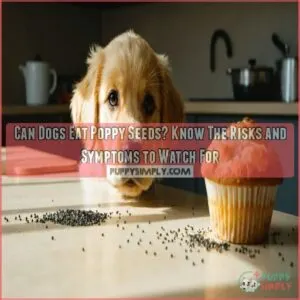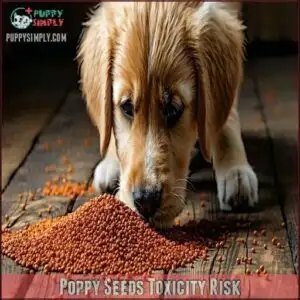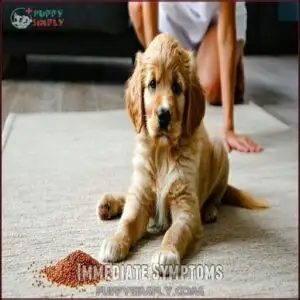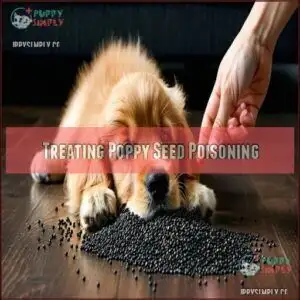This site is supported by our readers. We may earn a commission, at no cost to you, if you purchase through links.
 No, dogs shouldn’t eat poppy seeds.
No, dogs shouldn’t eat poppy seeds.
These tiny seeds may seem harmless, but they contain compounds called opiates that can be toxic to dogs, even in small amounts.
Eating poppy seeds can cause symptoms like sedation, confusion, slowed breathing, and even severe issues like tremors or seizures.
The risk depends on the dog’s size and how much they’ve eaten, but it’s never worth the gamble. If your pup gets into something with poppy seeds, call your vet immediately—it’s better safe than sorry.
Keep tempting goodies with poppy seeds out of reach, because curiosity and wagging tails often spell trouble!
Table Of Contents
- Key Takeaways
- Poppy Seeds Toxicity Risk
- Can Dogs Eat Poppy Seeds
- Poppy Seed Ingestion Symptoms
- Treating Poppy Seed Poisoning
- Preventing Poppy Seed Exposure
- Frequently Asked Questions (FAQs)
- What if my dog ate a poppy seed?
- Are papaya seeds safe to eat?
- Can dogs eat bread with poppy seeds?
- Can dogs eat poppies?
- Can dogs eat poppy seed dressing?
- Are poppy seeds poisonous to dogs?
- What happens if a dog eats poppy seeds?
- Can dogs eat poppy seed muffins?
- What happens if dogs eat poppy seeds?
- Can dogs eat bagels with poppy seeds?
- Conclusion
Key Takeaways
- Don’t let your dog eat poppy seeds, as they contain toxic opiates that can harm the nervous system.
- Even small amounts of poppy seeds can cause symptoms like lethargy, confusion, vomiting, or breathing issues.
- If your dog eats poppy seeds accidentally, call your vet right away for guidance and treatment.
- Keep foods with poppy seeds securely stored and train your dog to avoid unsafe items.
Poppy Seeds Toxicity Risk
Poppy seeds might seem harmless, but they can pose a real risk to your dog’s health due to their natural alkaloids.
Even small amounts could lead to serious symptoms, so it’s best to keep them out of reach.
Toxic Components in Poppy Seeds
Even though poppy seeds seem harmless, they may carry opium residue due to contamination risks during processing.
These seeds can contain harmful substances like morphine and codeine, which come from alkaloids.
Alkaloid effects in dogs include central nervous system disruptions and possible toxicity.
While the seeds might appear harmless, their unseen dangers make avoiding poppy seeds toxicity an easy way to protect your dog.
Risk Levels and Quantities
Poppy seeds toxicity depends on seed concentration and a dog’s size.
Toxicity varies by seed amount and dog size—small exposures can still pose serious risks, so always keep poppy seeds out of reach.
While safe quantities are low, individual sensitivity varies, making it tricky to gauge risks.
Here’s what to know:
- A lethal dose can result from consuming large amounts of unprocessed seeds.
- Even small amounts may trigger poppy seed poisoning in sensitive dogs.
- Toxicity variations arise due to morphine and codeine levels.
Effects on Different Dog Sizes
Size matters in the context of poppy seed poisoning in dogs.
Smaller breeds face higher risks due to their lower metabolism rates and dosage sensitivity. Puppy vulnerability is also a concern since their systems are still developing.
Larger dogs may tolerate more, but symptoms like lethargy or confusion can still appear.
Always monitor for effects on dogs, regardless of size, to prevent poppy seed poisoning.
Can Dogs Eat Poppy Seeds
In regards to poppy seeds, dogs and these tiny seeds don’t mix well.
While they may seem harmless, the truth is more complicated. Poppy seeds contain alkaloids that can disrupt your dog’s central nervous system, making them unsafe for canine consumption.
You might wonder, “Are poppy seeds safe in small amounts?” The answer is no—dogs eat seeds like these at their own risk, as even trace amounts could lead to toxicity.
As the opiate content in poppy seeds can affect the central nervous system, it’s essential to avoid them altogether. Instead of risking long-term effects, stick to safe alternatives like chia or flaxseeds.
Curious about seed nutritional value? Chia and flax pack a punch without the dangers. And if your dog ate poppy seeds accidentally, don’t panic—just consult your vet immediately for guidance. Prevention beats regret!
Poppy Seed Ingestion Symptoms
If your dog eats poppy seeds, you’ll need to watch for signs that something’s wrong.
Keep an eye out—poppy seeds can cause serious health risks in dogs, even in small amounts. Stay vigilant!
Symptoms can range from mild stomach upset to serious issues like lethargy or trouble breathing, so knowing what to look for is essential.
Immediate Symptoms
When dogs ingest poppy seeds, toxicity symptoms can appear within hours.
Onset time varies, but common signs include vomiting and diarrhea. Neurological effects like lethargy or confusion may follow, along with breathing problems.
Opioid poisoning is a serious risk. Watch for these immediate symptoms:
- Vomiting or drooling
- Changes in appetite
- Diarrhea or stomach upset
- Lethargy or confusion
- Altered pupil size
The symptoms can be life-threatening and require immediate attention, as they may indicate opioid poisoning.
Delayed Reactions
Symptoms from poppy seeds in dogs can show a gradual onset, revealing unseen damage over time.
Chronic exposure may lead to subtle indicators like lethargy or vomiting. Watch for worsening signs hours later, as dog health risks increase with delayed reactions.
Here’s a quick guide:
| Symptom | Timing | Severity | Action | Risk |
|---|---|---|---|---|
| Lethargy | Within hours | Moderate | Monitor closely | Medium |
| Vomiting | Few hours later | High | Call a vet | High |
| Diarrhea | Delayed onset | Medium | Hydration recommended | Medium |
| Dehydration | Days if untreated | Severe | Immediate vet visit | High |
| Altered behavior | Gradual onset | High | Observation and consult | Critical |
Emergency Warning Signs
If your pup accidentally gets into poppy seeds, watch for emergency warning signs.
Symptoms like breathing difficulty, severe lethargy, or loss of coordination can escalate quickly.
Look out for these red flags:
- Sudden seizures or tremors.
- Risk of coma if untreated.
- Slow heart rate or unresponsiveness.
Contact your vet immediately—dog health risks from toxicity require swift action!
Behavioral Changes
It’s easy to miss subtle signs like confusion or hyperactivity, but they can signal poppy seed toxicity in dogs.
Watch for lethargy severity, coordination loss, or unusual behaviors.
Severe cases may progress to sedation or coma—true "coma watch" moments.
If your dog shows these symptoms after eating poppy seeds, opium toxicity could be the culprit.
Contact your vet immediately.
Treating Poppy Seed Poisoning
If your dog eats poppy seeds, acting quickly is key to preventing serious health issues.
Start by contacting your veterinarian, as treatment often involves removing toxins, providing supportive care, and monitoring recovery.
Decontamination Procedures
Treating dog poisoning caused by poppy seeds starts with quick action. Emetic administration helps remove toxins if caught early.
Activated charcoal absorbs lingering residue, while gastric lavage might be necessary for severe cases. Monitoring signs guarantees safety during procedures.
Veterinary care often includes fluid therapy, supporting recovery. Always contact your vet to navigate the best decontamination plan for your pup.
Supportive Care Methods
When treating dog poisoning from poppy seeds, supportive care is essential.
Fluid therapy through IV fluids prevents dehydration, while oxygen support helps with breathing difficulties.
Symptom management includes medications and activated charcoal to reduce toxin absorption.
Incorporate comfort measures like a calm environment and ample rest.
Nutritional support guarantees recovery, but always consult a veterinary specialist for appropriate treatment plans.
Due to the presence of alkaloids, opioid poisoning is possible, requiring careful monitoring and potentially leading to serious health issues.
Monitoring Protocol
Keep a close eye on your dog’s behavior after ingesting poppy seeds.
Symptom observation is key—watch for changes in activity levels or appetite.
Schedule veterinary checkups if symptoms persist.
Monitor hydration and make certain they’re drinking enough water.
Adjust their diet temporarily to ease digestion.
Early detection of toxicity symptoms can make all the difference in recovery.
Recovery Timeline
Recovery timelines for poppy seed toxicity in dogs vary depending on symptom severity and treatment impact.
Mild cases resolve quickly, while severe toxicity may take weeks. Here’s what to expect:
- Mild cases: 1–3 days.
- Severe cases: 7–14 days.
Follow-up care guarantees recovery, and full recovery depends on veterinary care and symptom duration.
Long-term effects, like organ damage, may linger.
Preventing Poppy Seed Exposure
You can keep your dog safe by staying mindful of where poppy seeds might show up in your home, from baked goods to pantry shelves.
Simple steps like storing food securely and training commands can go a long way in preventing accidental exposure to harmful substances.
Kitchen Safety Measures
After addressing treatment, let’s focus on kitchen precautions. Store poppy seeds securely, keeping them out of reach. Clean up spills promptly—curious pups love sniffing around!
Use safe utensils to avoid cross-contaminating dog food. Stick to proper cleaning protocols after handling toxic foods for dogs.
Alkaloids can be dangerous to your dog’s health. Dispose of waste carefully, ensuring no access to harmful ingredients like poppy seeds dogs might ingest, which is a serious risk.
Garden Safety Tips
Gardens can be dog havens or hazards! Protect your pet from poppy seeds and toxic foods with these tips:
- Safe Plants: Avoid poppies, opting for dog-friendly choices like marigolds.
For safer options, consider dog safe plants.
- Pest Control: Use pet-safe options to deter critters.
- Tool Storage: Keep garden tools away from curious paws.
- Fence Security: Secure fences to block access to harmful plants.
Training Commands
Teaching basic commands like “leave it” or “drop it” can stop a curious dog from ingesting toxic foods like poppy seeds.
Use positive reinforcement to encourage obedience, and consider advanced training or obedience classes for help tackling problem behaviors.
Rewarding good behavior is easier with high-value training incentives.
These skills create a safer environment, reducing the risk of pet poisoning and keeping your dog happy and healthy.
Safe Food Storage
Store poppy seeds safely to prevent pet poisoning. Use airtight containers to minimize cross-contamination and preserve shelf life.
Proper storage requires reliable food preservation. Keep them in secure locations, like high cabinets, away from curious noses.
Temperature control is key—avoid humid spots to prevent spoilage. Never leave baked goods containing poppy seeds on counters; dogs are sneaky, and a “harmless” snack can lead to serious ingestion risks. Proper storage and temperature control are crucial to prevent poppy seeds from causing harm.
Frequently Asked Questions (FAQs)
What if my dog ate a poppy seed?
Did you know just a teaspoon of poppy seeds can pose risks to dogs?
If your dog ate some, watch for vomiting, lethargy, or trouble breathing.
Call your vet immediately—better safe than sorry!
Are papaya seeds safe to eat?
Papaya seeds are safe for humans in small amounts, offering potential digestive benefits.
However, they contain trace toxins and a bitter taste.
Eating too many may upset your stomach, so moderation is key for safety.
Can dogs eat bread with poppy seeds?
Dogs shouldn’t eat bread with poppy seeds.
Even small amounts can harm them due to potential toxicity, leading to serious symptoms like lethargy or breathing issues.
Stick to safer bread options without poppy seeds.
Can dogs eat poppies?
A bright poppy in a field may seem harmless, but it’s not safe for dogs.
Poppies contain alkaloids that can harm your dog’s nervous system.
Keep your curious pup away from these colorful flowers!
Can dogs eat poppy seed dressing?
You shouldn’t let your dog eat poppy seed dressing.
While it may seem harmless, the dressing typically contains small amounts of poppy seeds, which can be toxic to dogs, leading to serious health risks like opioid poisoning.
Are poppy seeds poisonous to dogs?
You might think a few poppy seeds couldn’t hurt, but they’re actually toxic to dogs.
Even small amounts can cause lethargy or breathing problems.
Keep foods with poppy seeds out of paw’s reach for safety!
What happens if a dog eats poppy seeds?
If your dog eats poppy seeds, they risk symptoms like lethargy, confusion, or trouble breathing due to possible toxicity.
Even small amounts can be harmful, so contact your vet immediately if ingestion occurs, as this is a situation that requires immediate attention.
Can dogs eat poppy seed muffins?
No, dogs shouldn’t eat poppy seed muffins.
Even small amounts of poppy seeds can harm them, potentially causing toxicity.
Stick to dog-friendly treats and keep baked goods like these safely out of their reach.
What happens if dogs eat poppy seeds?
If your dog eats poppy seeds, it could experience symptoms like lethargy, confusion, or breathing trouble due to mild toxicity risks.
Even small amounts aren’t safe—keep poppy seeds and related foods far away.
Can dogs eat bagels with poppy seeds?
You might think a poppy seed bagel is harmless, but it’s a big no-no for your dog.
Even small amounts of poppy seeds can cause toxicity.
Stick to dog-safe treats to keep them healthy!
Conclusion
It seems ironic, but those tiny poppy seeds on baked goods can cause big trouble for your dog.
While they might look harmless, the opiates they contain can lead to harmful symptoms, ranging from sluggishness to severe seizures.
The bottom line: keep anything with poppy seeds out of your dog’s reach.
If they do eat some, act fast—call your vet immediately.
Dogs are curious creatures, so it’s up to you to keep them safe from risky snacks and ensure their well-being by taking immediate action in case of severe seizures.
















